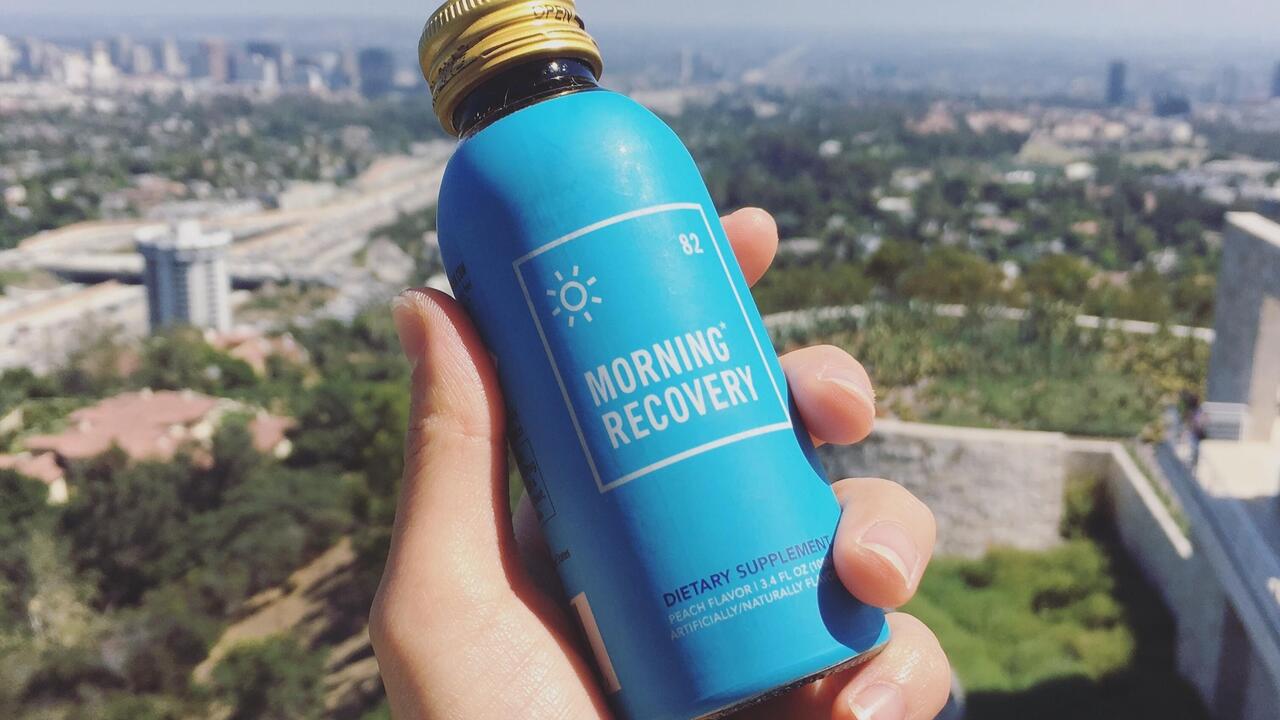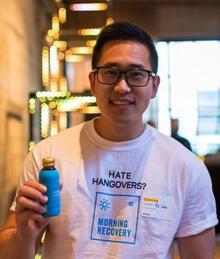
A promising solution to hangover misery
Ex-Tesla employee switches gears to create Morning Recovery

Ex-Tesla employee switches gears to create Morning Recovery
By Brian Caldwell Faculty of EngineeringWith a degree in systems design engineering in his back pocket, Sisun Lee was more than happy pursuing a career as a product manager at Tesla in sunny California.
But when an unlikely side project born of personal experience picked up steam, the 2014 Waterloo systems design engineering graduate took a deep breath and switched gears from electric cars to hangover prevention.
Lee and classmate Kenny Leung, who were rooming and working on school projects together just a few years ago, are now entrepreneurs chasing a share of a market they believe could be worth US $5 billion a year in the United States alone.
“It’s very exciting and, to be honest, very surreal,” says Lee, CEO and co-founder of a startup company called 82 Labs that is based in Los Angeles. “A lot of it is luck, for sure.”
Good fortune first shone when Lee, 27, took a vacation in his native South Korea in 2016 and did some hard drinking with friends while he was there.
Particularly prone to hangovers, he was introduced to products that are sold in practically every South Korean corner store and claim to reduce the day-after misery of too much booze.
Lee was so impressed by their effectiveness that he did some research when he got home to the San Francisco Bay Area and stumbled on a paper by a scientist at the University of California, Los Angeles.
Jing Liang, now a professor at the University of Southern California, had done research involving alcohol and a herbal compound called dihydromyricetin (DHM) that has been used in Asian hangover remedies for thousands of years.
Intrigued, Lee connected with Liang and got her to make up a small batch of drinks featuring DHM, then tried them out on himself and his friends.
Encouraged by plenty of positive feedback, he returned to South Korea and bluffed his way into getting 600 samples made at factories there for an investment of about $1,000.
 “I didn’t go in wearing flip-flops and shorts like I was in the Bay Area,” Lee says. “I was in suits, trying to be as formal as possible.”
“I didn’t go in wearing flip-flops and shorts like I was in the Bay Area,” Lee says. “I was in suits, trying to be as formal as possible.”
A whirlwind of trials, word of mouth, social media exposure, crowdfunding and online orders later, Lee quit his job at Tesla, enlisted Leung as a co-founder to take advantage of his e-commerce experience at Facebook and launched 82 Labs (82 is the telephone country code for South Korea) in mid-2017.
By the end of the year, after raising about $1.5 million in funding – including key support from Jordan Banks, the former managing director of Facebook Canada, through his investment company, Thunder Road Capital - and securing a South Korean supplier, the startup was on target to have shipped about 600,000 units and hit $3 million in sales.
Lee says the DHM in its Morning Recovery drink, which is sold online in 100 ml bottles costing about $5 each, helps the liver to break down alcohol to prevent the buildup of toxins that cause hangover symptoms.
He says the drink also minimizes the negative impact of alcohol on neurotransmitters in the brain and contains several other beneficial ingredients, including electrolytes to reduce dehydration.
Ideally, the drink should be taken while consuming alcohol or before turning in for the night after consuming alcohol.
Liang holds some equity, is on board as a technology adviser and has an intellectual property agreement with the company involving a proprietary method to extract and purify DHM.
With nine employees, the company hopes to get the approvals needed to sell Morning Recovery in Canada, shift production to North America, secure equity financing and reach at least $10 million in sales in 2018.
“I’m very grateful and right now I’m all in,” Lee says. “There’s no looking back. We are going to take this as far as we can and there are a lot of exciting things ahead.”

Read more
How Doug Kavanagh’s software engineering degree laid the foundation for a thriving career in patient care

Read more
Upside Robotics secures new funding to accelerate the future of sustainable farming

Read more
Redefining capstone learning by bringing students, faculty and community partners together to tackle real-world challenges
The University of Waterloo acknowledges that much of our work takes place on the traditional territory of the Neutral, Anishinaabeg, and Haudenosaunee peoples. Our main campus is situated on the Haldimand Tract, the land granted to the Six Nations that includes six miles on each side of the Grand River. Our active work toward reconciliation takes place across our campuses through research, learning, teaching, and community building, and is co-ordinated within the Office of Indigenous Relations.